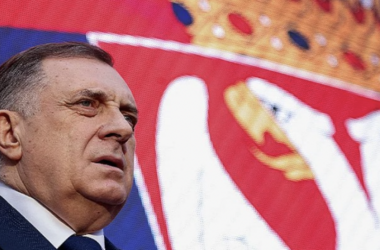As regional tensions escalate across the Middle East, Iran’s military leadership has issued a resolute warning to its adversaries: the Islamic Republic is prepared for any war. Speaking at a high-level meeting of senior commanders of the Islamic Revolutionary Guard Corps (IRGC), Major General Hossein Salami declared that Iran will not succumb to foreign pressure and is fully ready to respond to any form of aggression.
“We are absolutely not concerned about war,” Salami said during the Saturday meeting. “We will not initiate a war, but we are ready for any war.” His remarks underscore the growing military assertiveness of Tehran as it faces intensifying pressure from both Israel and the United States.
Escalation After Israeli Strike
Salami’s comments follow a period of rising conflict between Iran and Israel, particularly after an April 2024 Israeli airstrike on the Iranian consulate in Damascus. The attack killed several senior Iranian military officials and marked, in Salami’s words, “the beginning of a global confrontation.” In response, Iran launched a massive retaliatory barrage of hundreds of missiles and drones targeting Israeli military installations.
According to Salami, this counter-strike penetrated “the most fortified airspace in history,” referencing Israel’s advanced defense systems such as the Iron Dome and David’s Sling. “Our missiles shattered their illusion of security,” he declared, emphasizing that Tehran has developed both the strategic doctrines and the technological means to challenge Israeli defenses.
Although Israeli authorities at the time downplayed the impact of the Iranian retaliation—reporting only minor damage—Iranian officials portrayed the strike as a breakthrough and a warning of their military capabilities. Salami noted that Iran has integrated its anti-Israel strategies into “all elements of our weaponry and equipment,” suggesting that future strikes could be even more effective.
Strategic Posture and Regional Signals
In parallel to these developments, Iran has reportedly placed its military on high alert. According to a Reuters report citing Iranian officials, Tehran has issued stern warnings to neighboring countries that host American military bases, including Iraq, Kuwait, the UAE, Qatar, Turkey, and Bahrain. These states have been cautioned that allowing U.S. forces to use their airspace or territory to launch attacks against Iran will be seen as an act of aggression and will invite “severe consequences.”
This move appears to be a direct response to recent threats from U.S. President Donald Trump, who has warned that failure to reach a new agreement over Iran’s nuclear program could result in military action. In a letter reportedly sent to Iranian Supreme Leader Ayatollah Ali Khamenei, Trump called for direct talks while simultaneously threatening a bombing campaign if Iran does not halt its nuclear activities.
Iran has firmly rejected the proposal for direct talks. Foreign Minister Abbas Araghchi dismissed the offer as insincere, saying, “If you want negotiations, then what is the point of threatening?” Araghchi emphasized that Iran would only engage in discussions on “equal footing,” asserting that U.S. threats violate international norms and undermine trust.
The Nuclear Deal and Diplomatic Brinkmanship
At the heart of this diplomatic and military standoff lies the broken 2015 Joint Comprehensive Plan of Action (JCPOA), a landmark nuclear agreement brokered under the Obama administration. In return for curbing its nuclear program, Iran was promised sanctions relief. However, President Trump unilaterally withdrew the United States from the accord in 2018, launching a “maximum pressure” campaign that reimposed crippling sanctions on Tehran.
Iran responded by progressively rolling back its compliance with the agreement, enriching uranium beyond the limits set by the JCPOA and accelerating its nuclear research. Despite these developments, Tehran continues to insist that its nuclear program is solely for peaceful purposes.
While Iran has dismissed direct dialogue with the U.S., it has not entirely shut the door on diplomacy. Reuters reported that Iran remains open to indirect negotiations, possibly facilitated through intermediaries such as Oman. “Indirect talks offer a chance to evaluate Washington’s seriousness about a political solution,” an Iranian official stated. However, even these potential discussions are expected to be “rocky,” with trust in short supply and the stakes unusually high.
Iran’s Strategic Messaging
Salami’s statements can be seen as part of a broader campaign of strategic messaging designed to reinforce deterrence and reassure domestic audiences. By projecting confidence in Iran’s military capabilities, Tehran aims to show that it is not intimidated by threats from Israel or the U.S.
“Our nation will not take a single step back,” Salami said. “We have the knowhow and formulas to overcome the enemy.” He emphasized Iran’s ability to counter both psychological warfare and direct attacks, suggesting that Tehran is prepared for an all-encompassing confrontation if one arises.
This posture reflects Iran’s dual strategy of deterrence and resistance. On one hand, it signals a willingness to engage diplomatically—albeit on its own terms. On the other, it underscores a readiness to escalate militarily if diplomacy fails.
The Regional Context
The renewed saber-rattling comes at a time of broader instability in the region. The war in Gaza has galvanized anti-Israel sentiment across much of the Muslim world, including in Iran, where the government continues to portray itself as a defender of Palestinian resistance. The IRGC, in particular, sees its role in supporting Hezbollah in Lebanon and various militias in Syria and Iraq as part of a broader “axis of resistance” against Israel and Western influence.
Meanwhile, Russia has voiced concern about Washington’s threats toward Iran. Moscow has called for restraint and warned against actions that could trigger a wider conflict in the Middle East, where the lines between proxy wars and direct confrontation are increasingly blurred.
Possible Outcomes
The current trajectory between Iran, Israel, and the U.S. presents several potential outcomes—none of them without risk. The first one, return to diplomacy. The best-case scenario involves a resumption of indirect negotiations, potentially leading to a reworked nuclear deal. This would require mutual trust-building, concessions, and guarantees against further unilateral actions by the U.S.Second possibility-escalation into regional conflict.Should Israel or the U.S. carry out additional strikes—especially targeting Iranian nuclear facilities—Tehran could retaliate on a broader scale. Given Iran’s missile capabilities and regional network of allied militias, this could spark a much wider war involving Lebanon, Syria, Iraq, and even Gulf states.Thirdly, low-intensity proxy war. Iran and its adversaries might continue with tit-for-tat strikes via proxies—such as Hezbollah or various militias—avoiding direct war but maintaining a simmering level of conflict.Finally, internal Iranian consolidation. Regardless of the external outcome, Iran’s leadership may use this period of confrontation to consolidate domestic power, using national sentiment to rally public support and silence critics amid economic hardship and political unrest.
Major General Hossein Salami’s stark warning encapsulates Iran’s current strategy: defiance, deterrence, and controlled escalation. Tehran appears unwilling to bend to pressure but remains open to diplomacy under strict conditions. As the geopolitical chessboard across the Middle East becomes increasingly volatile, the actions of a few key players—Iran, Israel, the U.S., and their regional partners—could determine whether the region steps back from the brink or plunges deeper into confrontation.
In this complex and combustible environment, every signal, speech, or strike carries immense weight. The coming weeks could shape not only the future of Iran’s nuclear program but the broader stability of the Middle East.




